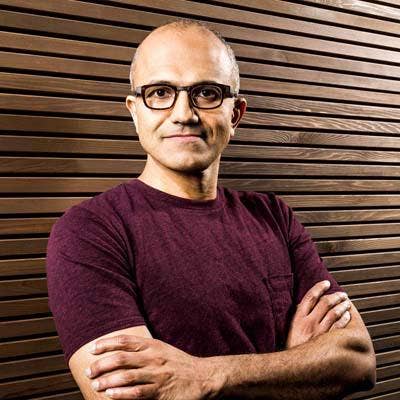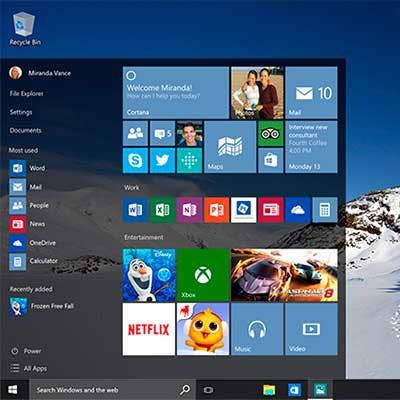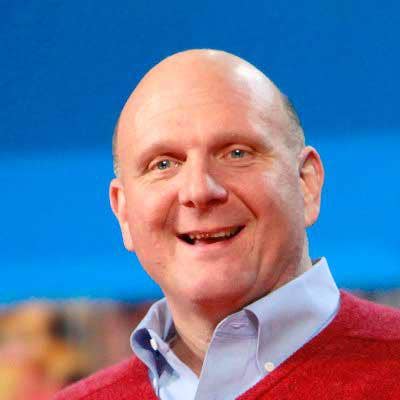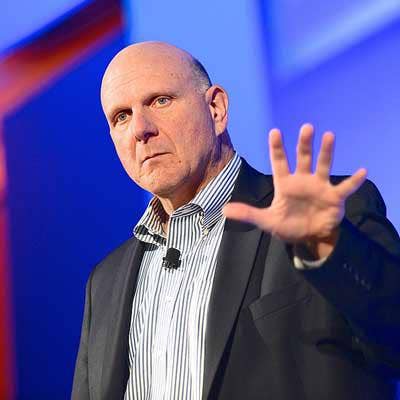9 Interesting, Funny And Weird Moments From Microsoft's Annual Shareholder Meeting

Meeting Time
Microsoft held its annual meeting with shareholders Dec. 2, and as is usually the case at these events, a number of important issues came to the fore during the Q&A session. There were also some funny moments, as well as one that can only be described as bizarre.
This year's agenda was even more packed than usual, as Microsoft gave investors updates on Windows 10 adoption and the growth of its cloud businesses. Taking center stage were new Microsoft products like the Surface Pro 4 and Surface Book laptop, and CEO Satya Nadella talked about 16 acquisitions the company made during its fiscal 2015 year and how they're helping to diversify the software giant's portfolio.
Former CEO Steve Ballmer, Microsoft's largest individual shareholder, voiced his concerns over the software giant's cloud sales reporting practices and its efforts to let developers build apps that run on smartphones, tablets and PCs.
Following are nine examples of interesting, funny and weird things that happened at the event.

9. Padmasree Warrior Officially Joins Microsoft Board
Warrior, the former Cisco Systems chief technology and strategy officer who left in September after seven years at the networking vendor, attended the shareholder meeting and was officially elected to Microsoft's board of directors during the event.
Microsoft's board nominated Warrior in October, and Chairman John Thompson said in an SEC filing at the time that she "brings significant experience in driving technology and operational innovation across a global company, and in forging growth through strategic partnerships and new business models."
Microsoft and Cisco have been doing a lot of strategic partnering lately. In 2014, the vendors inked a three-year agreement to integrate and jointly market their respective data center portfolios. One of the first fruits from that effort, Cisco Cloud Architecture for the Microsoft Cloud Platform -- which integrates Cisco's ACI with Microsoft's Windows Azure Pack -- hit the market earlier this year.

8. 'You're Just A Hoodlum'
It's not unusual for irate shareholders to attend annual meetings to give vendor executives a piece of their minds, but what happened toward the end of the Microsoft meeting was definitely out of the ordinary.
During the Q&A, a female shareholder related a scenario in which she went to Microsoft's headquarters in Redmond, Wash., to ask for a meeting with executive management, only to have the police show up and issue her a warning for trespassing.
The woman claimed that she's no longer permitted on the Redmond campus, except for the Microsoft Store. When several audience members chuckled, the woman turned around and snapped, "It's not funny!"
The woman asked if Microsoft would consider adding a Chinese member to its board of directors, and Microsoft Chairman John Thompson responded that the company doesn't exclude Chinese or any other ethnic group when considering new members. Nadella noted that Microsoft has two Chinese-American women in senior leadership positions.
The woman then asked if Microsoft would help get the trespass warning against her revoked, and President and Chief Legal Officer Brad Smith responded that he'd look into it. But this apparently wasn't enough, as the woman told Smith, "You're just a hoodlum," before giving up control of the microphone.

7. Nadella Learned A Lesson From 'Women Shouldn't Ask For Raises' Gaffe
At the Microsoft shareholder meeting, Nadella said Microsoft has instituted mandatory "unconscious bias training" to more than 100,000 people, and has made strides in hiring a more diverse workforce.
"This is not just another corporate training session for us. It was more about getting a conversation going so that everyone inside the company can get comfortable having a rich dialogue about how important our culture of inclusiveness is going to be," Nadella said of the training.
In October 2014, Nadella ignited controversy by claiming that women in technology shouldn't ask for raises and should instead trust in "the system" in their companies to compensate them appropriately.
The fact that Nadella said this at the Grace Hopper Celebration of Women in Computing conference, which is focused on women technologists, triggered a swift and spirited backlash, and he subsequently issued an apology.
Gwen Houston, Microsoft's general manager of diversity and inclusion, told the Puget Sound Business Journal in June that Nadella learned a great deal from his verbal misstep.
"Satya's comments at Grace Hopper have been humbling for him and humbling for us," Houston told the journal. "But I've been inspired by how he's taken that and made it a learning moment. Not just for himself, but for all his leaders."

6. Enterprises Are Loving Windows 10
If Microsoft is truly going to exorcise the demons of Windows 8, it's going to have to convince enterprises to get onboard with Windows 10. So far, there are early signs that this plan is working out. Microsoft said in October that 110 million devices are already running Windows 10, including more than 8 million business PCs.
At the shareholder meeting, Nadella said enterprise adoption of Windows 10 "is off to a great start," with big customers like British Telecom, China Light and Power, St. Thomas Hospital and Kimberly Clark having already deployed the OS.
However, although consumer sales of Windows 10 have been strong, Synnex President and CEO Kevin Murai said in September that many businesses are holding off on deploying Windows 10 until overall market adoption increases.

5. Microsoft Has (Or Had) A Windows Pep Talk Program At Colleges
Did you know Microsoft has a program called UCrew, in which college students promote Windows and other products on campuses in the U.S. and around the world?
Apparently, Microsoft did have such a program until recently, and during a Q&A session at the shareholder meeting, a recent University of Oklahoma graduate claimed it has been canceled and asked executives to explain why.
Nadella said he wasn't familiar with the UCrew program and said he'd look into its current status. Microsoft President and Chief Legal Officer Brad Smith said he wasn't familiar with the program either.
Microsoft CFO Amy Hood did know about the UCrew program but she didn't provide a definitive answer about its status. Hood did say that engaging with university students is "critical to our future success."

4. Rev. Jesse Jackson Asks About Microsoft's Overseas Cash
Microsoft keeps around 90 percent of its roughly $90 billion in cash overseas to avoid paying U.S. taxes. During a speech at the shareholder meeting, the Rev. Jesse Jackson, the noted civil rights leader, asked Microsoft executives if they would consider bringing this money back stateside if legislation were enacted to provide vendors with tax credits for doing so.
Brad Smith, Microsoft's president and chief legal officer, offered the same response that Microsoft and other technology vendors routinely give to such questions: that tax laws need to change before we'll consider bringing our cash home.
"We definitely welcome the opportunity to have a conversation about how to get, I'll say, repatriation legislation unstuck in Congress," Smith said in response to Jackson's question. "I think there's a broad sense in the business community, and more generally in the country, that it would make more sense to put this capital to work in the United States rather than leave American companies holding so much capital overseas."

3. Ballmer Doesn't Think Universal Windows Apps Will Solve Windows Phone App Shortage
Former Microsoft CEO Steve Ballmer apparently doesn't think Nadella's Windows Universal Apps strategy -- in which developers write one set of code for apps that run on smartphones, tablets and PCs -- is going to work out.
When a shareholder asked Nadella during the Q&A why Windows Phone still doesn't have popular apps for Starbucks and other vendors, the Microsoft CEO basically said hold tight, this issue will be addressed by the Windows Universal apps strategy.
But Ballmer, speaking to Bloomberg, said "That won't work," and that he'd prefer to see Microsoft add support for running Android apps on the Windows Phone platform.

2. Seattle Seahawks-San Francisco 49ers Rivalry Flares Up
The Seattle Seahawks are Microsoft's hometown team and lots of employees are fans. The San Francisco 49ers are Silicon Valley's team. So it was probably inevitable that the bitter divisional rivalry between the two teams would boil over at the Microsoft shareholder meeting.
It all went down when Melinda Grant, senior analyst relations manager for Microsoft's Operating Systems Group, and Ashley Frank, a Microsoft partner business evangelist, were demonstrating some of Microsoft's latest products and technologies.
When conversation shifted to the capabilities of Microsoft's Cortana technology, Frank (a Seahawks fan) teased Grant (a 49ers fan) by asking whether the digital personal assistant kept her up to date on all of the 49ers losses (a painfully barbed question, considering the team's 3-8 record at the time).
Grant was a good sport about the whole thing, responding that "even though we have different roles at work and we root for different teams on the weekend, we sure gain a lot by working together."

1. Ex-Microsoft CEO Says Company's Cloud Reporting Is 'Bulls--t'
Microsoft Chairman John Thompson, in his opening remarks, said the software giant has been "communicating more and sharing more information than ever before about the critical growth metrics, increases in users, market share, revenue and profit."
But Steve Ballmer, the former Microsoft CEO who handed over the reins to Satya Nadella in February 2014, has a different view.
Nadella said in October that Microsoft's commercial cloud business was on an $8.2 billion annualized run rate. But Ballmer told Bloomberg that he thinks it's "bulls—t" to use run rate and that Microsoft should instead share revenue figures instead.
As CEO, Ballmer might have preferred to keep Microsoft's cloud sales numbers close to the vest for competitive reasons. But as Microsoft's largest individual shareholder, Ballmer seems to prefer that the software giant follow Amazon Web Services' lead and report its quarterly revenue figures straight up.